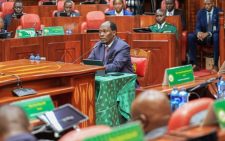CBK tightens law against dirty money

The Central Bank of Kenya (CBK) is pushing for amendments to the draft Anti-Money Laundering / Countering the Financing of Terrorism (AML/CFT) legislation to address existing loopholes and intensify efforts against money laundering and the financing of terrorism.
This comes as global partners apply pressure to strengthen anti-money laundering measures. To prevent potential disruptions to these efforts, CBK is advocating for stricter penalties for designated reporting agents found in violation of the Proceeds of Crime and Anti-Money Laundering Act (POCAMLA) and its Regulations.
Previously, some professionals, including lawyers, were hesitant to serve as reporting agents.
The proposed changes would subject them to penalties not exceeding Sh5 million (Kenyan Shillings) for a violation, with natural persons facing a maximum penalty of one million shillings.
Additionally, there would be supplementary penalties of up to Sh100,000 for each day or part thereof, during which a violation or non-compliance persists. Beyond reporting agents, other institutions like banks, money remittance providers, foreign exchange bureaus, digital credit providers, directors, officers, employers, and individuals would also be prohibited from violating the Act.
“The clause will clothe CBK with powers to penalise financial intuitions for POCAMLA violations and violation of regulations, guideline and instructions issued under the CBK Act. This will enhance effectiveness of AML/CFT laws,” CBK governor Kamau Thugge told the Finance and National Planning Committee yesterday.
CBK is further pushing for a new definition of “beneficial owner” to be incorporated into key legislations including the CBK Act, Microfinance Act, Banking Act, and National Payment System Act.
The term “beneficial owner” would refer to the natural person on whose behalf a transaction is conducted. This definition would also be included in the categorization of a “significant shareholder” under the aforementioned acts.
As international pressure mounts to address these concerns, these changes are anticipated to bolster Kenya’s AML/CFT framework and contribute to a more robust financial regulatory landscape.
Financial Reporting Centre (FRC) which is pushing for watertight anti-money laundering regulations in line with Financial Action Task Force (FATF), has since agreed with lawyers to make them agents. FATF is the global money laundering and terrorist financing watchdog.











